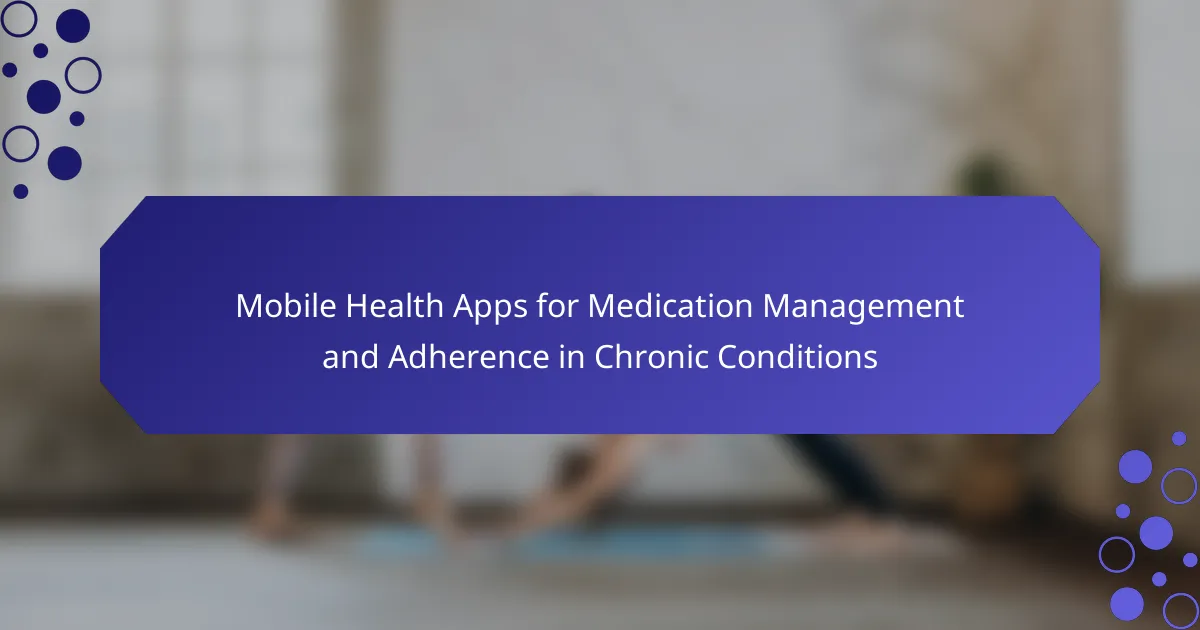Mobile health apps for medication management and adherence are transforming care for chronic conditions. They provide personalised reminders, track medication schedules, and enhance communication with healthcare providers. These tools improve patient engagement and health outcomes while addressing challenges like usability and data privacy. Key features include educational resources, real-time monitoring, and gamification elements that motivate users to adhere to treatment plans.
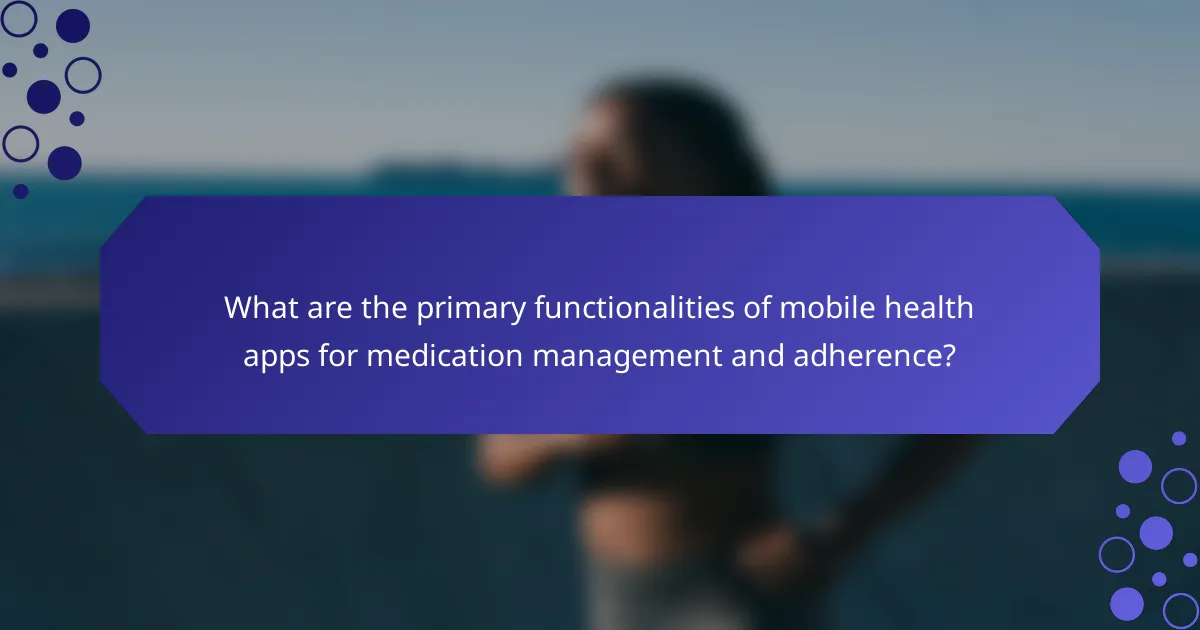
What are the primary functionalities of mobile health apps for medication management and adherence?
Mobile health apps for medication management and adherence enhance patient care through various functionalities. These apps offer reminders for medication intake, track adherence, and provide educational resources on chronic conditions. They also allow for medication scheduling and enable communication with healthcare providers. As a result, users experience improved health outcomes and reduced medication errors. These applications often integrate features like refill reminders and side effect tracking, addressing unique patient needs effectively.
How do these apps improve medication adherence for chronic conditions?
Mobile health apps enhance medication adherence for chronic conditions by providing reminders, tracking medication intake, and offering educational resources. These tools empower patients to manage their health effectively, leading to improved treatment outcomes. For instance, studies show that users of such apps experience a 30% increase in adherence rates. Additionally, features like personalised notifications and progress tracking cater to individual needs, making medication management more accessible. As a result, mobile health apps play a crucial role in supporting patients with chronic conditions in their daily health routines.
Which features are essential for effective medication tracking?
Essential features for effective medication tracking include reminders, dosage management, adherence reports, and user-friendly interfaces. These attributes enhance user engagement and ensure timely medication intake. Additionally, integration with health records and the ability to track side effects provide valuable insights for both users and healthcare providers. A unique attribute is the option for personalised medication schedules based on user habits.
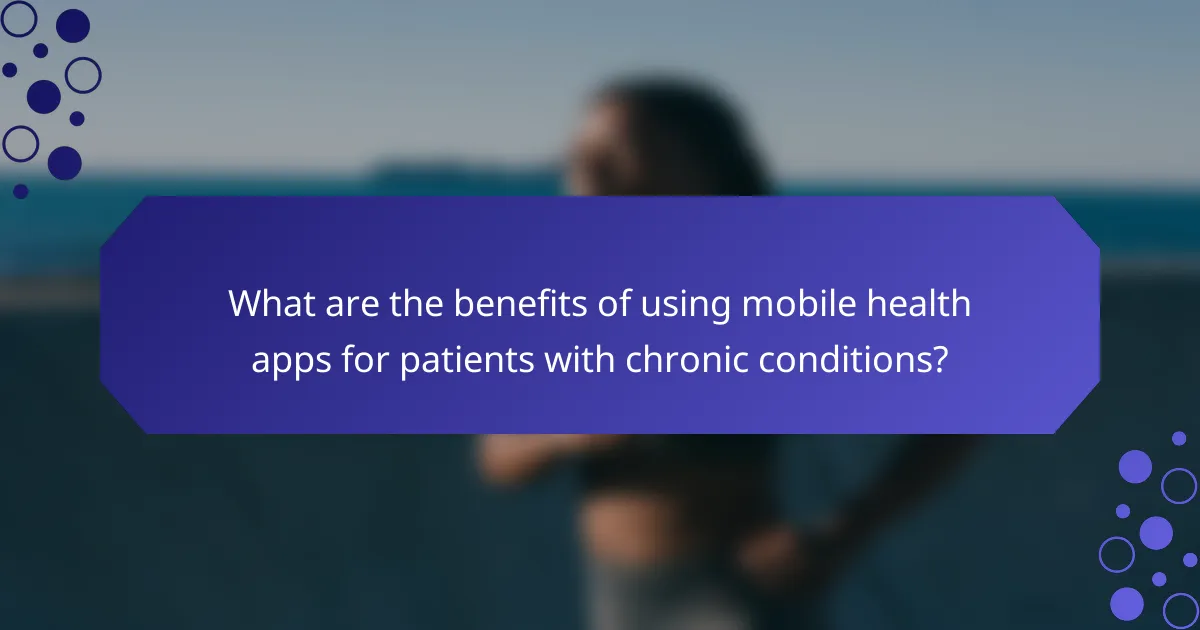
What are the benefits of using mobile health apps for patients with chronic conditions?
Mobile health apps enhance medication management and adherence for patients with chronic conditions by providing personalised reminders, tracking medication schedules, and facilitating communication with healthcare providers. These tools improve patient engagement and health outcomes.
1. Improved adherence: Studies show that mobile health apps can increase medication adherence rates by up to 30%.
2. Real-time monitoring: Patients can track their symptoms and medication intake, enabling better management of chronic conditions.
3. Enhanced communication: Apps allow for direct messaging with healthcare professionals, fostering timely interventions.
4. Personalised reminders: Customisable alerts help patients remember when to take medications, reducing missed doses.
5. Educational resources: Many apps provide information about conditions and treatments, empowering patients to make informed decisions.
How do these apps enhance patient engagement and education?
Mobile health apps enhance patient engagement and education by providing accessible information and personalised support. These apps often include medication reminders, educational resources, and tracking features that empower patients to manage their chronic conditions effectively.
For example, apps can deliver tailored content based on individual health needs, improving adherence rates. Studies show that patients using these apps report higher satisfaction and better understanding of their treatment plans. Additionally, features like interactive symptom trackers and community forums foster a sense of connection and support among users.
As a result, mobile health apps serve as vital tools in promoting patient autonomy and informed decision-making in chronic disease management.
What impact do mobile health apps have on health outcomes?
Mobile health apps significantly improve health outcomes by enhancing medication management and adherence in chronic conditions. These applications provide reminders, track medication usage, and offer educational resources, leading to better patient engagement. Studies show that consistent use of such apps can increase adherence rates by up to 50%. Additionally, personalised feedback and data analytics help healthcare providers monitor patient progress and adjust treatment plans effectively. This tailored approach addresses unique patient needs, fostering a more proactive management of chronic illnesses.
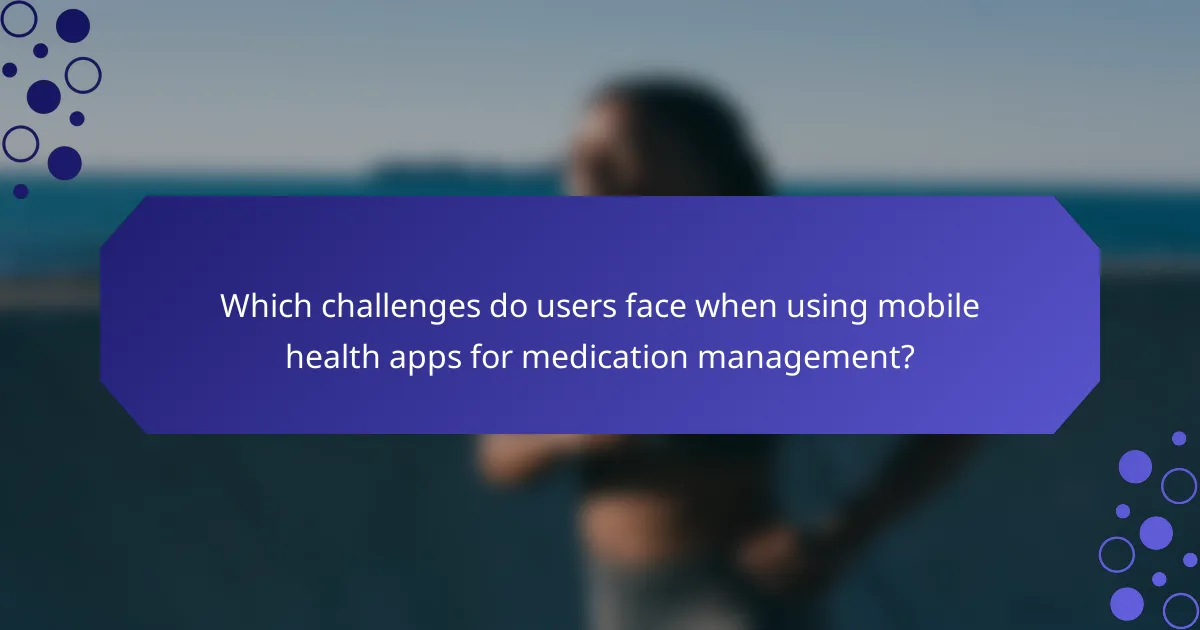
Which challenges do users face when using mobile health apps for medication management?
Users face several challenges with mobile health apps for medication management, including usability issues, data privacy concerns, and integration with healthcare systems. Many users find interfaces complex, leading to frustration. Privacy concerns arise from sharing sensitive health data. Additionally, lack of synchronisation with healthcare providers can hinder effective medication adherence. These challenges can reduce user engagement and limit the effectiveness of the apps in managing chronic conditions.
What are common technical issues encountered by users?
Common technical issues encountered by users of mobile health apps for medication management include login problems, data synchronisation errors, and notification failures. Users often struggle with app crashes and slow performance, impacting adherence. Compatibility issues with devices and operating systems also pose challenges. Lastly, inadequate user support can hinder problem resolution.
How do privacy concerns affect user adoption?
Privacy concerns significantly hinder user adoption of mobile health apps for medication management. Users prioritise data security and confidentiality, fearing misuse of personal health information. Studies show that 60% of potential users hesitate due to privacy issues. Ensuring robust encryption and transparent data policies can enhance trust. Moreover, unique attributes like user-controlled data sharing settings can further alleviate concerns, encouraging wider usage.
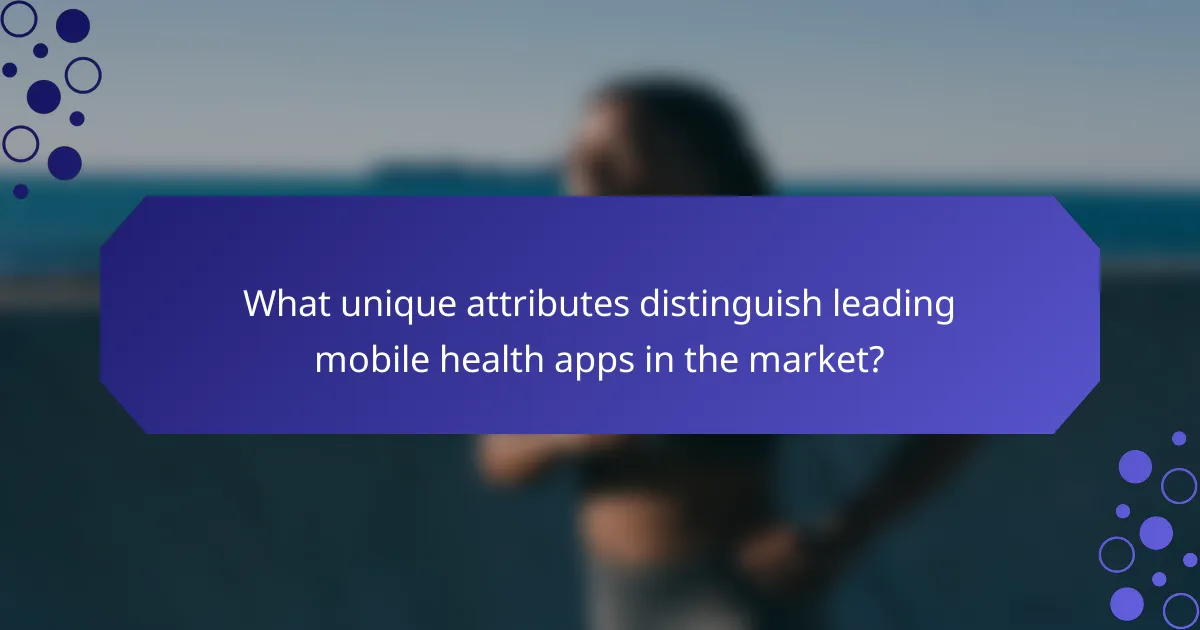
What unique attributes distinguish leading mobile health apps in the market?
Leading mobile health apps for medication management and adherence in chronic conditions stand out due to unique attributes such as personalised reminders, integration with wearable devices, and real-time data analytics. These features enhance user engagement and adherence rates. Additionally, some applications offer telehealth capabilities, allowing users to consult healthcare professionals directly through the app. Unique attributes like gamification elements further motivate users to stick to their medication schedules. Finally, advanced security measures ensure user data privacy, which is essential in health-related applications.
Which innovative technologies are being integrated into these apps?
Mobile health apps for medication management increasingly integrate innovative technologies. These include artificial intelligence for personalised reminders, machine learning for adherence tracking, and telehealth features for real-time consultations. Additionally, data analytics enhance patient engagement by providing insights on medication usage patterns. Wearable device integration allows for seamless health monitoring, improving overall management of chronic conditions.
How do personalisation features enhance user experience?
Personalisation features significantly enhance user experience in mobile health apps by tailoring content and reminders to individual needs. These features improve medication adherence by providing customised alerts based on user preferences and health conditions. For instance, users can receive notifications at optimal times for taking medications, which increases the likelihood of adherence. Additionally, apps can analyse user behaviour and adjust recommendations, ensuring relevant information is always presented. This level of personalisation fosters a stronger connection between the user and the app, ultimately leading to better health outcomes.
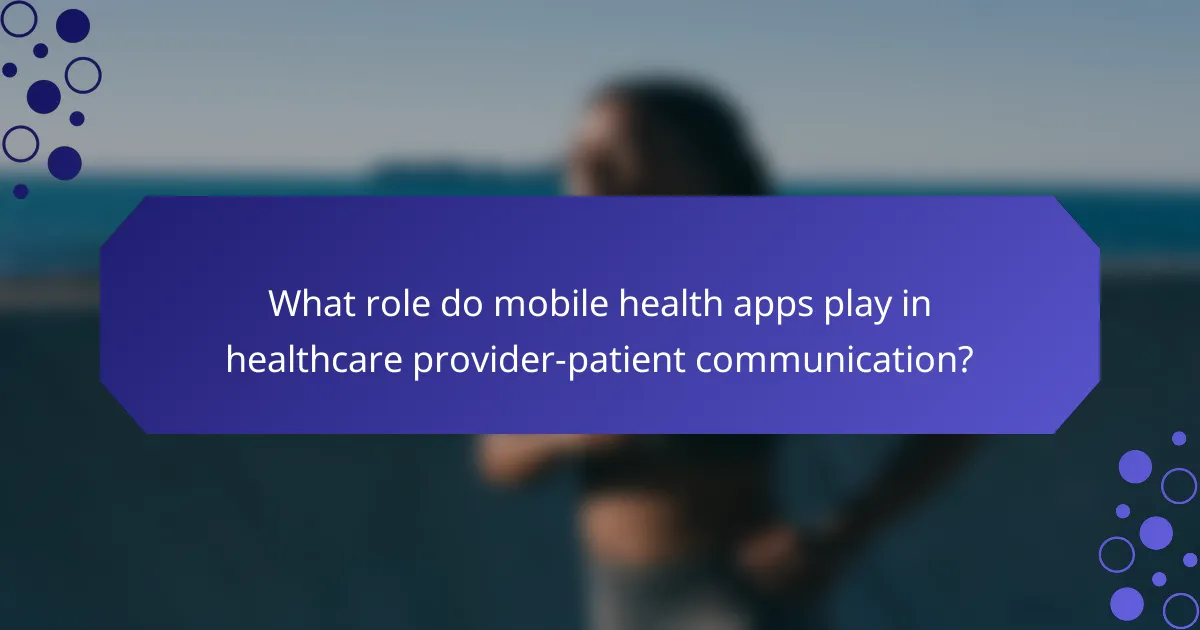
What role do mobile health apps play in healthcare provider-patient communication?
Mobile health apps significantly enhance communication between healthcare providers and patients. These apps facilitate real-time messaging, medication reminders, and symptom tracking, leading to better adherence in chronic conditions. As a result, patients receive timely interventions, improving overall health outcomes. Additionally, features like secure data sharing allow providers to monitor patient progress effectively. This dynamic interaction fosters a collaborative environment, empowering patients in their treatment journey.
How can these apps facilitate better collaboration between patients and healthcare teams?
Mobile health apps enhance collaboration by facilitating real-time communication between patients and healthcare teams. These apps enable secure messaging, appointment scheduling, and medication reminders, ensuring that both parties remain informed and engaged.
Additionally, features like symptom tracking and data sharing allow healthcare providers to monitor patient progress closely. This fosters a proactive approach to care, where adjustments can be made swiftly based on the patient’s needs.
The integration of educational resources within these apps empowers patients to take an active role in their health management. By understanding their conditions better, patients can communicate more effectively, leading to improved adherence and outcomes.
Overall, mobile health apps serve as a bridge, connecting patients and healthcare teams in a continuous loop of feedback and support.
What are the implications for telehealth integration?
Telehealth integration enhances mobile health apps by improving medication management and adherence for chronic conditions. It allows real-time data sharing between patients and healthcare providers, facilitating personalised care.
Telehealth supports remote monitoring, enabling timely interventions when patients miss doses or experience side effects. This proactive approach can lead to better health outcomes and reduced hospital visits.
The integration fosters patient engagement through features like reminders and educational resources, promoting adherence. Studies show that telehealth can increase adherence rates by up to 30%, showcasing its significant impact.
Additionally, telehealth integration streamlines communication, allowing healthcare providers to adjust treatment plans based on patient feedback. This responsiveness is crucial for managing chronic conditions effectively.
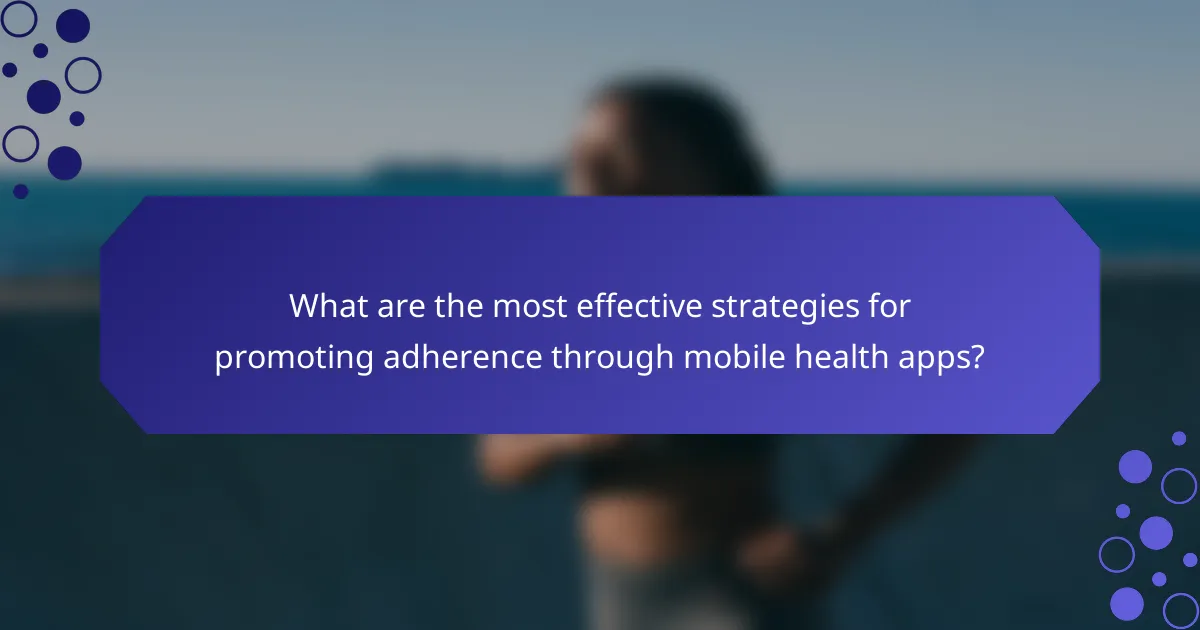
What are the most effective strategies for promoting adherence through mobile health apps?
Mobile health apps can effectively promote adherence through personalised reminders, educational content, and progress tracking. These features enhance user engagement and accountability.
1. Personalised Reminders: Tailored notifications ensure users take medications on time, addressing unique schedules and preferences.
2. Educational Content: Providing information about the condition and treatment fosters understanding and encourages adherence.
3. Progress Tracking: Users can monitor their medication intake and health metrics, reinforcing positive behaviour.
4. Community Support: Integrating forums or support groups offers social encouragement, enhancing motivation to adhere to treatment plans.
5. Gamification: Reward systems for achieving adherence milestones make the process engaging and enjoyable.
6. Data Sharing: Allowing users to share progress with healthcare providers facilitates timely interventions and adjustments.
How can reminders and notifications be optimized for user engagement?
Reminders and notifications can be optimized by personalising content, timing, and delivery methods. Tailoring messages to individual user preferences increases engagement and adherence. Utilizing push notifications at optimal times enhances the likelihood of timely medication intake. Integrating gamification elements, such as rewards for consistent adherence, can further motivate users. Data analytics can identify patterns in user behaviour, allowing apps to refine their reminder strategies effectively.
What best practices should users follow to maximize the benefits of these apps?
To maximize the benefits of mobile health apps for medication management, users should follow specific best practices. First, set reminders for medication times to enhance adherence. Second, maintain an updated medication list within the app to track prescriptions accurately. Third, use the app’s features to record side effects or concerns, which can be shared with healthcare providers. Lastly, engage with educational resources provided by the app to understand medication purposes and potential interactions. These practices support effective management of chronic conditions and improve overall health outcomes.
